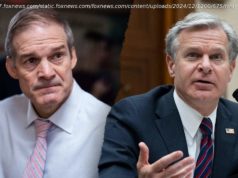The move punctuated what has been a sharp fall from favor for David J. Shulkin, who delivered President Trump a string of bipartisan legislative victories.
WASHINGTON — After weeks of uncertainty atop the Department of Veterans Affairs, President Trump said on Wednesday he plans to replace its secretary, David J. Shulkin, with Dr. Ronny L. Jackson, the White House physician and a rear admiral in the Navy.
The announcement punctuated what has been a sharp fall from favor for Dr. Shulkin, a politically moderate former hospital executive, who delivered Mr. Trump a string of bipartisan legislative victories at a time when he was struggling to find them. And it adds to a significant shake-up of Mr. Trump’s senior staff, which has already included the secretary of state, director of the C. I. A. and the president’s national security adviser.
Mr. Trump called Dr. Jackson “highly respected” and thanked Dr. Shulkin for “service to our country and to our great veterans.”
Mr. Trump said that Robert Wilkie, the under secretary for defense personnel and readiness at the Defense Department, would serve as acting secretary in the meantime, bypassing the department’s deputy secretary, Thomas G. Bowman.
Dr. Shulkin did not immediately respond to requests for comment.
As secretary, Dr. Shulkin helped guide into law measures meant to improve services for the more than 20 million veterans in the United States. Those included an expansion of the G. I. Bill for post-9/11 veterans, legislation that makes it easier for the department to remove bad employees and a law that streamlines the appeals process for veterans seeking disability benefits.
Mr. Trump, who made veterans issues and overhauling the scandal-ridden department a focal point of his campaign, showered Dr. Shulkin with praise. At a bill-signing ceremony in June, Mr. Trump teased that the secretary need never worry about hearing his “Apprentice”-era catchphrase, “You’re fired.”
“We’ll never have to use those words on our David,” the president said. “We will never use those words on you, that’s for sure.”
But in recent months, a group of conservative Trump administration appointees at the White House and the department began to break with the secretary and plot his ouster. At issue was how far and how fast to privatize health care under the department’s health system, a long-sought goal for conservatives.
The officials — who included Dr. Shulkin’s press secretary and assistant secretary for communications, along with a top White House domestic policy aide — came to consider Dr. Shulkin, who had run the health program under President Barack Obama, and his top deputy as obstacles to one of the administration’s policy goals.
The secretary’s troubles only grew when what had been an internal power struggle burst into the open in February, after the department’s inspector general issued a scathing report describing “serious derelictions” related to a trip Dr. Shulkin took last year to Britain and Denmark. The report found that the secretary had spent much of the trip sightseeing and improperly accepted Wimbledon tickets as a gift.
Critics of the secretary seized on the report to try to hasten his removal. Dr. Shulkin, fearing a coup, went public with a warning about officials “trying to undermine the department from within” and cut off those he saw as disloyal.
The efforts backfired. At the White House, senior officials came to believe that Dr. Shulkin had misled them about the contents of the report. And the secretary’s public declarations only further aggravated top officials, who felt Dr. Shulkin had gone too far in commenting on internal politics with news outlets and had opened the administration to sharp criticism over his trip to Europe, which the report said cost more than $122,000.
As recently as early March, after meetings with John F. Kelly, the White House chief of staff, Dr. Shulkin publicly claimed victory, signaling that he had the White House’s support to remove officials opposing him.
But the victory seemed short-lived. In short order, Dr. Shulkin began markedly curtailing his public profile, cutting off communications with reporters and isolating himself from top deputies he viewed as disloyal. People who have spoken with the secretary in recent days said he was determined to keep his post, even as it became increasingly clear his time was up. He was set to meet with leaders from the nation’s largest veterans groups on Thursday.
Dr. Shulkin remained overwhelmingly popular on Capitol Hill, where the Senate unanimously confirmed him last year, and among the veterans groups that have traditionally held outsize influence in Washington. In recent weeks, leaders from both parties publicly and privately signaled their support, even as rumors of his replacement appeared in news reports.
But Mr. Trump had enough. He began to discuss successors in recent weeks, even considering Energy Secretary Rick Perry as a possibility. He told friends last weekend that he would fire Dr. Shulkin, it was just a question of when.
Dr. Shulkin’s departure could clear the way for a more aggressive push for government-subsidized private care at the department. Dr. Jackson and his policy views are little known on Capitol Hill, where lawmakers will have the final say on the matter.
Representative Phil Roe of Tennessee, the Republican chairman of the House Veterans Affairs Committee, said Wednesday that he considered Dr. Shulkin a friend and regretted his departure.
“I think he’s done a fantastic job and I hate to see him go,” Mr. Roe said. “That said, I respect President Trump’s decision, support the president’s agenda and remain willing to work with anyone committed to doing the right thing on behalf of our nation’s veterans.”
Home
United States
USA — Political Veterans Affairs Secretary Is Latest to Go as Trump Shakes Up Cabinet






